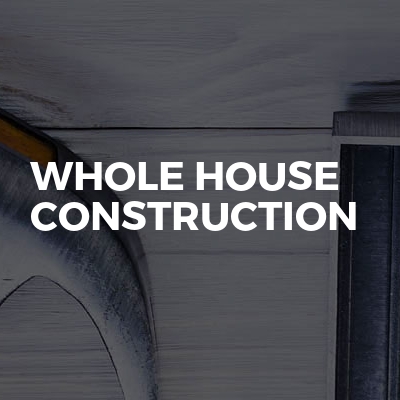Garage Conversions in Cirencester
MRP Construction: Premier Builders in Hanham, Gloucestershire
Welcome to MRP Construction, the leading builders... read more »
Welcome to Combined Construction Solutions Limited, your trusted partner for all construction needs in North Wroughton and across Wiltshi... read more »
Welcome to Dodeca Design & Build Ltd, the premier choice for all your construction and renovation needs in Swindon and throughout the pic... read more »
Welcome to C&K Building Ltd, your trusted partner for all your building needs in Tuffley and across Gloucestershire. As a dedicated team... read more »
Welcome to SAWC, your go-to experts for all your home improvement needs in Blunsdon St Andrew and across the beautiful county of Wiltshir... read more »
Cottle Construction is a premier choice for those seeking expert building services in Yate and throughout Gloucestershir... read more »
Welcome to Crow's Nest Building Services, your premier choice for builders, extension builders, bathroom fitters, kitchen fitters, loft c... read more »
Welcome to MSD Building & Design, your go-to experts for all building and design needs in Filton and throughout Gloucestershire. We are p... read more »
Craig Freeman Carpentry is a premier choice for those seeking expert carpentry and renovation services in Purton... read more »
Welcome to Roto Renovation Ltd, your premier choice for expert renovation services in Bondend and throughout Gloucestershire. A... read more »
Welcome to Cheltenham Woodcraft Ltd, your trusted builders and extension specialists based in the heart of Gloucester. Serving the vibran... read more »
Welcome to Noes Building Construction, your trusted partner for all your home improvement needs in Bradley Stoke and the wider Gloucester... read more »
Whole House Construction: Premier Builders in Wotton-under-Edge
Welcome to Whole House Construction, your truste... read more »
PAR Building Services, nestled in the vibrant area of Nine Elms, is your go-to expert for all things construction in Wil... read more »
Welcome to Raw Developments, your trusted partner for all your building and renovation needs in the heart of Lydiard Plainread more »
Innovation Building And Maintenance Ltd is a premier choice for all your construction and renovation needs in Ev... read more »
Welcome to Faby Construction Ltd, your premier choice for builders in Upper Stratton, proudly serving the entire Wiltshire region. Specia... read more »
Welcome to The Bespoke Cabin Company, your go-to experts for Garden Rooms, Garage Conversions, and Property Maintenance... read more »
Dynamic By Design Limited is a premi... read more »
Welcome to Beechwood Property Maintenance, your go-to... read more »
Search Garage Conversions in places nearby
Understanding Garage Conversions in Cirencester
Garage conversions in Cirencester have become increasingly popular as homeowners seek to maximise their living space without the need for a costly extension. By transforming an underutilised garage into a functional room, residents can enjoy additional space for a variety of purposes. Whether it's a home office, a playroom, or an extra bedroom, the possibilities are endless. This article explores the ins and outs of garage conversions, providing a comprehensive guide for those considering this home improvement project.
The Benefits of Garage Conversions
Garage conversions offer numerous advantages, making them an attractive option for homeowners. Firstly, they provide additional living space without the need for a full-scale extension, which can be both time-consuming and expensive. Secondly, converting a garage can significantly increase the value of a property, making it a wise investment for the future. Moreover, with the rise of remote working, many people are looking for dedicated home office spaces, and a converted garage can serve this purpose perfectly.
Cost-Effectiveness
One of the primary benefits of garage conversions is their cost-effectiveness. Compared to building an extension, converting an existing garage is generally much cheaper. The structure is already in place, which means less construction work is required. This can result in significant savings on labour and materials.
Increased Property Value
Another advantage of garage conversions is the potential increase in property value. By adding an extra room, homeowners can make their property more appealing to potential buyers. This is particularly beneficial in a competitive housing market, where additional space can set a property apart from others.
Planning and Regulations
Before embarking on a garage conversion project, it's essential to understand the planning and regulatory requirements. In Cirencester, as in other parts of the UK, certain permissions may be needed, depending on the nature of the conversion.
Planning Permission
In many cases, garage conversions fall under permitted development rights, meaning that planning permission is not required. However, there are exceptions, particularly if the property is listed or located in a conservation area. It's always advisable to check with the local planning authority to ensure compliance with all regulations.
Building Regulations
Regardless of whether planning permission is needed, all garage conversions must comply with building regulations. These regulations ensure that the conversion is safe and energy-efficient. Key areas covered by building regulations include structural integrity, fire safety, insulation, and ventilation.
Design Considerations
When planning a garage conversion, careful consideration should be given to the design. The aim is to create a space that is both functional and aesthetically pleasing.
Space Utilisation
Maximising the available space is crucial in a garage conversion. This may involve clever storage solutions, such as built-in cupboards or shelving, to keep the area clutter-free. Additionally, the layout should be planned to ensure that the space is used effectively.
Lighting and Ventilation
Garages often lack natural light and ventilation, so it's important to address these issues during the conversion. Installing windows or skylights can help bring in natural light, while proper ventilation can be achieved through the use of extractor fans or vents.
Choosing the Right Professionals
While some homeowners may choose to undertake a garage conversion as a DIY project, hiring professionals can ensure a high-quality finish and compliance with all regulations.
Architects and Designers
An architect or designer can help create a detailed plan for the conversion, taking into account the homeowner's needs and preferences. They can also provide valuable advice on materials and finishes.
Builders and Contractors
Choosing the right builders and contractors is crucial for the success of the project. It's important to select professionals with experience in garage conversions and to check references and reviews before making a decision.
Common Uses for Converted Garages
The versatility of garage conversions means they can be used for a wide range of purposes. Here are some popular options:
- Home Office: With more people working from home, a dedicated office space can improve productivity and work-life balance.
- Guest Bedroom: A converted garage can provide comfortable accommodation for visitors, complete with an en-suite bathroom if space allows.
- Playroom: A safe and fun environment for children to play, keeping toys and clutter out of the main living areas.
- Home Gym: A private space for exercise, equipped with gym equipment and mirrors.
- Studio or Workshop: Ideal for artists, musicians, or hobbyists who need a dedicated space for their craft.
Cost Breakdown of Garage Conversions
Understanding the costs involved in a garage conversion can help homeowners budget effectively. While costs can vary depending on the size and complexity of the project, here is a general breakdown:
| Item | Estimated Cost |
|---|---|
| Design and Planning | £500 - £1,500 |
| Building Work | £5,000 - £10,000 |
| Insulation and Heating | £1,000 - £2,500 |
| Windows and Doors | £1,000 - £3,000 |
| Flooring and Finishes | £1,000 - £2,000 |
| Electrical and Plumbing | £1,000 - £3,000 |
Potential Challenges and Solutions
While garage conversions offer many benefits, they can also present challenges. Being aware of these potential issues can help homeowners plan effectively and avoid common pitfalls.
Structural Issues
Older garages may have structural issues that need to be addressed before conversion. This could include dampness, subsidence, or inadequate foundations. A thorough inspection by a structural engineer can identify any problems and suggest solutions.
Insulation and Heating
Garages are often not insulated, which can make them cold and uncomfortable. Proper insulation is essential to create a warm and energy-efficient space. Additionally, installing a suitable heating system, such as underfloor heating or radiators, can ensure the converted space is comfortable year-round.
Environmental Considerations
With growing awareness of environmental issues, many homeowners are looking for ways to make their garage conversions more sustainable.
Energy Efficiency
Improving the energy efficiency of a converted garage can reduce energy bills and minimise the environmental impact. This can be achieved through high-quality insulation, energy-efficient windows and doors, and the use of sustainable materials.
Renewable Energy
Incorporating renewable energy sources, such as solar panels or heat pumps, can further enhance the sustainability of a garage conversion. These technologies can provide clean energy for heating and electricity, reducing reliance on fossil fuels.
Legal and Insurance Considerations
It's important to consider the legal and insurance implications of a garage conversion. This can help avoid potential issues and ensure the project is fully compliant.
Legal Requirements
In addition to planning permission and building regulations, there may be other legal requirements to consider. For example, if the property is leasehold, permission may be needed from the freeholder. It's important to check all legal aspects before proceeding with the conversion.
Insurance
Once the garage conversion is complete, it's essential to update the home insurance policy to reflect the changes. This can ensure that the new space is covered in the event of damage or loss.
Frequently Asked Questions
- Do I need planning permission for a garage conversion in Cirencester? In most cases, planning permission is not required, but it's always best to check with the local planning authority.
- How long does a garage conversion take? The duration of a garage conversion can vary, but it typically takes between four to six weeks.
- Can I convert a detached garage? Yes, detached garages can be converted, although they may require additional work to connect utilities.
- What is the cost of a garage conversion? Costs can vary, but a typical garage conversion in Cirencester may range from £10,000 to £20,000.
- Will a garage conversion add value to my home? Yes, a well-executed garage conversion can increase the value of a property.
- Can I do a garage conversion myself? While it's possible to undertake a garage conversion as a DIY project, hiring professionals can ensure a high-quality finish and compliance with regulations.
Garage conversions in Cirencester offer a practical and cost-effective way to enhance living space and add value to a property. By understanding the planning and design considerations, homeowners can create a functional and attractive space that meets their needs. With careful planning and the right professionals, a garage conversion can be a rewarding home improvement project.
Send a message























